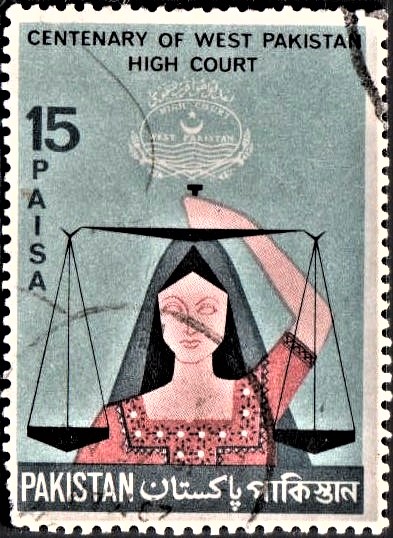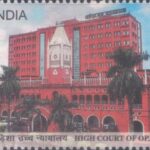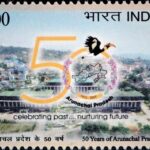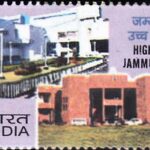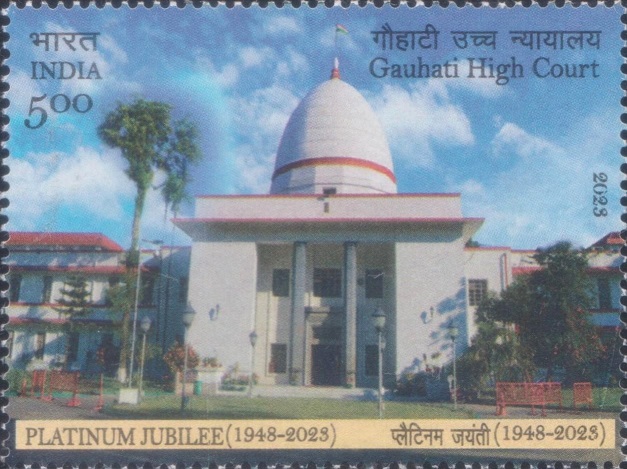
Gauhati High Court
A commemorative postage stamp on the Platinum Jubilee of Gauhati High Court, having jurisdiction of Assam, Arunachal Pradesh, Nagaland and Mizoram :
 Issued by India
Issued by India
Issued on Apr 5, 2023
Issued for : The Gauhati High Court is celebrating its Platinum Jubilee on 5th April, 2023. On the occasion of the Platinum Jubilee year of the Gauhati High Court, the Department of Posts, Government of India, is pleased to issue a Commemorative Postage Stamp and salutes its contribution in the development of the north east region of the country..
Credits :
Stamp/FDC/Brochure : Ms. Himani
Cancellation Cachet : Smt. Nenu Gupta
Type : Stamp, Mint Condition
Colour : Multi Colour
Denomination : 500 Paise
Stamps Printed : 303600
Printing Process : Wet Offset
Printer : Security Printing Press, Hyderabad
About :
- The Gauhati High Court as of today emerged from the High Court of Assam. On 9th September 1947, the Assam Legislative Assembly adopted a resolution that a High Court be established for the Province of Assam. On 1st March, 1948, the Governor General of India promulgated the Assam High Court Order, 1948, under the provisions of the Government of India Act, 1935, establishing the High Court of Assam with effect from 5th April, 1948, at Shillong (the then capital of Assam, now in present day Meghalaya). Sir R.F. Lodge was sworn in as the first Chief Justice of Assam High Court on 5th April, 1948.
- The High Court of Assam shifted to the Old Commissioner’s Building at Gauhati on 14th August, 1948. It was subsequently shifted to a dome structured building (now the Old Block of the Gauhati High Court) on 20th February, 1957, and then to its present location (now the New Block of the Gauhati High Court) adjacent to the mighty Brahmaputra river on 16th December, 2013.
- With the creation of the State of Nagaland on 1st December, 1963, the High Court of Assam came to be known as the High Court of Assam and Nagaland. On the reorganization of the North-Eastern region by the North Eastern Area (Reorganization) Act, 1971, a common High Court, called the Gauhati High Court, was established for the five North-Eastern States of Assam, Nagaland, Manipur, Meghalaya and Tripura and the two Union Territories of Mizoram and Arunachal Pradesh. The Gauhati High Court became the common High Court for the 7 (seven) States of North Eastern India after the Union Territories of Mizoram and Arunachal Pradesh attained statehood.
- With the establishment of separate High Courts for the States of Manipur, Meghalaya and Tripura on 23rd March, 2013, the Gauhati High Court now has jurisdiction over the States of Assam, Nagaland, Mizoram and Arunachal Pradesh, with its Principal Seat at Guwahati and 3 (three) permanent Benches in Kohima (Nagaland), Aizawl (Mizoram) and Itanagar (Arunachal Pradesh).
- The Gauhati High Court has played a seminal role in the separation of the judiciary from the executive in the States of Nagaland, Mizoram and Arunachal Pradesh. The neighbouring States of Nagaland, Mizoram and Arunachal Pradesh with its colourful and diverse customary laws and practices are unique in itself. Handed down from generations, the customary laws and practices recognize the Village Council consisting of the elders of a tribe as the supreme decision-making body of the village. Special provisions in relation to customary laws and practices conferred upon the States of Nagaland and Mizoram under Article 371A and Article 371G respectively of the Constitution of India have been staunchly protected by the Gauhati High Court in various landmark decisions.
- The Gauhati High Court administers justice in an area having enormous variations, geographically as well as ethnically. Divergent laws govern the people of the region. The indigenous inhabitants of the hill areas are primarily adapted to the conciliatory process rather than the adversarial system. Some of the customary practices for settlement of disputes prevalent in this area are not only expeditious and lasting, but far more efficacious than the system followed in the rest of the country. The laws applicable to different areas may vary, but the entire area is administered by a common High Court. Notable legal luminaries, including Fakhruddin Ali Ahmed (former President of India); Keshab Chandra Gogoi (former Chief Minister of Assam); Dinesh Goswami (former Union Minister); Justice Ranjan Gogoi (former Chief Justice of India) and many others have graced the corridors of the Gauhati High Court and contributed to its development. These celebrated legal luminaries and countless others are the toast of the legal fraternity and this institution pays its homage to these great personalities.
- Text : Based on information provided by the proponent.


